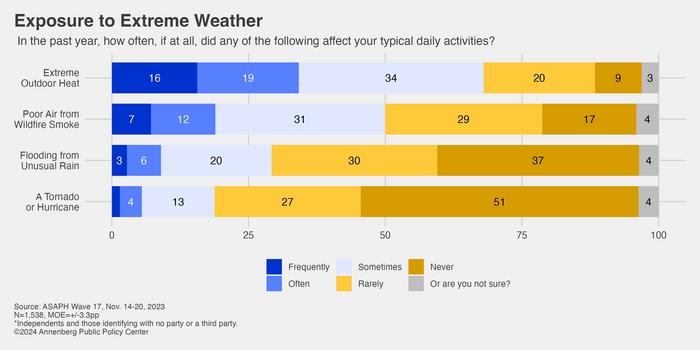Most Americans report having personally experienced the effects of extreme weather, according to new survey data from the Annenberg Public Policy Center that finds support for pro-environmental government policies meant to lessen the effects of climate change.
More than 6 in 10 people favor increased investment in energy-efficient public transit and an equal number support providing tax credits to families who install rooftop solar or battery storage, according to the nationally representative panel survey, fielded in November 2023 with over 1,500 U.S. adults.
Two-thirds of U.S. adults say that in the past year their typical daily activities were affected either sometimes, often, or frequently by extreme outdoor heat, and half say that their typical daily activities were affected sometimes, often, or frequently by poor air quality resulting from wildfire smoke.
Importantly, an analysis finds a connection between these reported experiences and policy support: exposure to extreme weather is associated with support for a half-dozen policies intended to mitigate the effects of climate change, policies that are contained in the Inflation Reduction Act of 2022.
Annenberg opens new Climate Communication division
The findings were released at an opening session of the Society of Environmental Journalists’ (SEJ) 33rd annual conference, #SEJ2024, which was held at the University of Pennsylvania. Penn’s Annenberg Public Policy Center (APPC) hosted the group in celebration of the Penn Center for Science, Sustainability, and the Media. APPC director Kathleen Hall Jamieson released the findings at the SEJ conference on April 3, 2024.
“We’ve traditionally assumed that experiencing a threat will affect policy preferences,” Jamieson said. “In this polarized time, on this polarized topic, that assumption holds true. People who report exposure to extreme weather are more supportive of measures to help address climate change.”
Jamieson also announced that APPC, now celebrating its 30th anniversary, is marking the occasion with the creation of a Climate Communication division, led by Annenberg School for Communication vice dean and professor Emily Falk, who heads a communication neuroscience lab at Penn. The new climate division joins APPC’s Communication Science and Institutions of Democracy divisions, which are headed, respectively, by Penn Integrates Knowledge Professor Dolores Albarracín and political science Professor Matt Levendusky.
“This moves the policy center into an important new area in which communication plays a crucial role,” Jamieson said.
Experiencing extreme weather
APPC’s survey, the 17th wave of a nationally representative panel of 1,538 U.S. adults, finds that millions of Americans report that extreme weather has affected their daily lives over the past year (subtotals may not add due to rounding):
- Temperature: Over 4 in 10 (45%) say temperatures in their local area were warmer than usual last summer.
- Heat: Two-thirds (68%) say extreme outdoor heat either sometimes (34%), often (19%), or frequently (16%) affected their typical daily activities.
- Smoke: Half (50%) say poor air quality resulting from wildfire smoke either sometimes (31%), often (12%), or frequently (7%) affected their typical daily activities.
- Flooding: 29% say flooding produced by unusual levels of rain either sometimes (20%), often (6%), or frequently (3%) affected their typical daily activities.
- Tornado/hurricane: 19% said a tornado or hurricane either sometimes (13%), often (4%), or frequently (1%), affected their typical daily activities.
Support for pro-environment measures
More than half of Americans strongly or somewhat favor a series of government steps designed to mitigate the effects of climate change. Although these steps were not identified as such in the survey, these measures are contained in the Inflation Reduction Act of 2022, which was passed by the 117th Congress and signed into law by President Joe Biden on Aug. 16, 2022.
Support for these government initiatives varied widely by party affiliation and was driven by Democrats, who expressed strong support for all. Support by Republicans was much weaker.
In these findings, “favor” includes strongly favor and somewhat favor. The survey found that:
- 62% favor increased investment in energy-efficient public transit.
- 86% Democrats, 44% independents, 42% Republicans
- 62% favor tax credits for rooftop solar or battery storage.
- 80% Democrats, 52% independents, 46% Republicans
- 60% favor community grants to protect against impacts of climate change.
- 85% Democrats, 50% independents, 36% Republicans
- 57% favor forgivable loans for rural communities improving energy efficiency.
- 78% Democrats, 43% independents, 38% Republicans
- 56% favor taxing corporations based on carbon emissions to reduce climate change.
- 81% Democrats, 41% independents, 33% Republicans
- 46% favor tax credits for electric cars.
- 71% Democrats, 29% independents, 26% Republicans
The initiative that garnered the most support (“strongly favor”) was community grants to protect against impacts of climate change (27%). The initiative that had the greatest opposition (“strongly oppose”) was tax credits for electric cars (18%). The policy with the strongest Democratic support was energy-efficient public transit (86%), while the one with the strongest Republican support was tax credits for rooftop solar or battery storage (46%).
Extreme weather exposure associated with policy support
A regression analysis of the survey data by APPC research analyst Shawn Patterson Jr. finds that reported exposure to extreme weather is associated with greater support for policies that address the effects of climate change. This support extends to both parties – Republicans who report experiencing extreme weather are more supportive of these policies than those who do not, and the same holds true for Democrats.
APPC’s ASAPH survey
The survey data come from the 17th wave of a nationally representative panel of 1,538 U.S. adults, first empaneled in April 2021, conducted for the Annenberg Public Policy Center by SSRS, an independent market research company. This wave of the Annenberg Science and Public Health Knowledge (ASAPH) survey was fielded November 14-20, 2023, and has a margin of sampling error (MOE) of ± 3.3 percentage points at the 95% confidence level. All figures are rounded to the nearest whole number and may not add to 100%. Combined subcategories may not add to totals in the topline and text due to rounding.
Download the topline and the methodology statement.
The policy center has been tracking the American public’s knowledge, beliefs, and behaviors regarding vaccination, Covid-19, flu, maternal health, climate change, and other consequential health issues through this survey panel for nearly three years. In addition to Jamieson and Patterson, the APPC team behind this survey includes Patrick E. Jamieson, director of the Annenberg Health and Risk Communication Institute, who developed the questions, and Ken Winneg, managing director of survey research, who supervised the fielding of the survey.
The Annenberg Public Policy Center was established in 1993 to educate the public and policy makers about communication’s role in advancing public understanding of political, science, and health issues at the local, state, and federal levels.
Method of Research
Survey






































